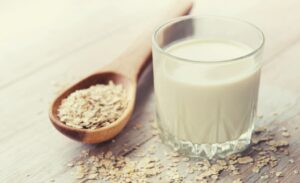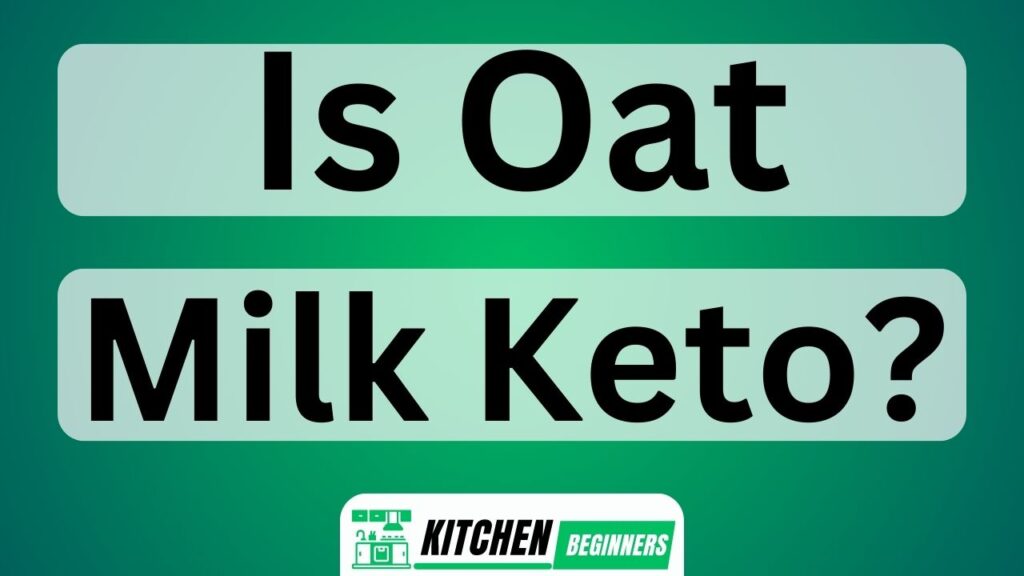In the world of alternative milk options, oat milk has gained considerable popularity due to its creamy texture and nutty flavor. However, for those following a ketogenic diet, which emphasizes low carbohydrate intake for optimal fat burning, the question arises: Is oat milk keto?
By juxtaposing the rising popularity of oat milk with the strict guidelines of the ketogenic diet, this article aims to provide an evidence-based answer. Understanding the nutritional composition of oat milk is crucial in determining its compatibility with a keto lifestyle. With its higher carbohydrate content compared to other non-dairy milks like almond or coconut milk, it might not be ideal for those strictly adhering to a ketogenic regimen.
Nevertheless, by balancing macros and incorporating oat milk in moderation, individuals can still enjoy the benefits of this plant-based beverage while staying within their dietary goals. Ultimately, making informed choices based on individual needs and preferences is key when navigating through various dietary options.
Key Takeaways Is Oat Milk Keto?
- Oat milk has a creamy texture and nutty flavor, but it has a higher carbohydrate content compared to other non-dairy milks.
- Oat milk is fortified with vitamins and minerals and is naturally free from cholesterol and lactose.
- While oat milk can be consumed in moderation on a keto diet, it requires careful consideration of portion sizes and adjustments to macronutrient ratios.
- Keto-friendly alternatives to oat milk include almond milk, coconut milk, hemp milk, cashew milk, and macadamia nut milk.
Understanding the Ketogenic Diet
The ketogenic diet, often referred to as keto, is a low-carb and high-fat eating plan that promotes ketosis in the body. This metabolic state occurs when the body runs out of glucose and starts using stored fat for energy instead.

Many people turn to this diet because it has been associated with numerous benefits, such as weight loss, improved insulin sensitivity, and increased mental clarity.
While following a ketogenic diet, individuals are encouraged to consume foods that are low in carbohydrates but high in healthy fats. Some examples of keto-friendly food options include meats, fish, eggs, nuts, seeds, avocados, and certain dairy products.
These foods provide the necessary nutrients while keeping carbohydrate intake minimal.
Now let’s explore the nutritional composition of oat milk without compromising ketosis.
Nutritional Composition of Oat Milk
To determine if it fits within your keto diet, you may want to know that oat milk typically contains around 15 grams of carbohydrates per cup. Oat milk is made by soaking and blending oats with water, then straining out the solids. It is often fortified with vitamins and minerals, making it a good source of nutrients like vitamin D, calcium, and iron.

Additionally, oat milk is naturally free from cholesterol and lactose, making it suitable for those who have dietary restrictions or intolerances. Some studies suggest that oat milk may have health benefits such as improved digestion and heart health due to its fiber content. However, it’s important to note that the carbohydrate content in oat milk can vary depending on brands and added sweeteners.
Transitioning into the subsequent section about the carbohydrate content in oat milk, let’s explore how this impacts its suitability for a keto diet without compromising taste or texture.
Carbohydrate Content in Oat Milk
If you’re looking to enjoy a low-carb beverage that still provides essential nutrients, it’s worth considering the carbohydrate content in oat milk. Oat milk is generally higher in carbohydrates compared to other non-dairy milks like almond or coconut milk.

A typical serving of oat milk contains around 16 grams of carbohydrates, with some variations depending on the brand and added sweeteners. The glycemic index (GI) of oat milk can also vary, but it is generally considered to be moderate. This means that consuming oat milk may cause a slower rise in blood sugar levels compared to high GI foods.
Understanding the carbohydrate content and glycemic index of oat milk can help individuals following a ketogenic diet make informed choices about their beverage options. Transitioning into the next section about the impact on blood sugar levels, it is important to note how these factors can affect overall dietary goals without compromising taste and nutritional value.
Impact on Blood Sugar Levels
Experience the satisfying feeling of stable energy levels throughout the day by incorporating oat milk into your diet. Oat milk has a moderate impact on blood sugar levels due to its carbohydrate content and glycemic index. It provides a slow and steady release of glucose into the bloodstream, helping to regulate blood sugar levels and prevent spikes or crashes. This can be especially beneficial for individuals with diabetes or those looking to maintain steady energy levels throughout the day.

- Feel confident knowing that oat milk won’t cause sudden drops in blood sugar.
- Enjoy sustained energy without the jitters or crashes associated with other beverages.
- Maintain optimal focus and productivity throughout the day.
- Support overall health by stabilizing blood sugar levels.
Incorporating oat milk into a ketogenic lifestyle is possible by considering portion sizes and adjusting macronutrient ratios as needed.
Fitting Oat Milk into a Ketogenic Lifestyle
Incorporating oat milk into a ketogenic lifestyle requires careful consideration of portion sizes and adjustments to macronutrient ratios. Oat milk is not typically considered keto-friendly due to its higher carbohydrate content compared to other milk alternatives. A cup of oat milk can contain around 16 grams of carbohydrates, which can significantly impact blood sugar levels and hinder the body’s ability to enter ketosis.
However, some individuals may be able to fit small amounts of oat milk into their daily carbohydrate limit by carefully measuring their portions and adjusting their meal plans accordingly. It’s important to note that there are numerous keto-friendly alternatives to oat milk available, such as almond milk or coconut milk, which offer lower carbohydrate options while still providing a creamy texture and taste.
Transitioning from oat milk to these alternatives can help individuals maintain their ketogenic diet without compromising their health goals.
Alternatives to Oat Milk on a Keto Diet
Fitting oat milk into a ketogenic lifestyle can be challenging due to its higher carbohydrate content. However, there are plenty of alternatives available for those following a keto diet. These alternatives provide keto-friendly options that can still satisfy your cravings while keeping you in ketosis.
Consider these five options:
- Coconut milk: Rich in healthy fats and low in carbs.
- Almond milk: Another popular choice with minimal carbs.
- Hemp milk: Contains omega-3 fatty acids and is low in carbs.
- Cashew milk: Creamy and low in carbohydrates.
- Macadamia nut milk: High in healthy fats and extremely low in carbs.
These alternatives offer similar textures and flavors to oat milk, making it easier to transition away from it. By incorporating these keto-friendly options into your diet, you can still enjoy delicious beverages without compromising your goals.
Now let’s explore how to balance macros with oat milk consumption…
Balancing Macros with Oat Milk Consumption
Indulging in oat milk while maintaining a keto diet may seem impossible, but fear not – there’s a way to perfectly balance your macros and still enjoy the creamy goodness!
When it comes to keto-friendly milk options, alternatives like almond milk and coconut milk are often recommended due to their low carbohydrate content. However, if you’re craving the taste of oat milk, it’s possible to incorporate it into your diet in moderation.
Managing carb intake becomes key in this situation. Oat milk contains more carbohydrates compared to other keto-friendly options, so it’s important to be mindful of portion sizes and adjust your meals accordingly. By carefully monitoring your overall daily carbohydrate intake and pairing oat milk with low-carb foods, you can still savor its flavor without jeopardizing your ketosis state.
Transitioning into incorporating oat milk in moderation allows for more flexibility while adhering to a ketogenic lifestyle.
Incorporating Oat Milk in Moderation
Maximizing your diet’s flexibility while maintaining a keto lifestyle is possible through mindful portion control and strategic pairing of the creamy goodness you crave. When it comes to oat milk, moderation is key.
While oat milk can be enjoyed on a keto diet, it should be consumed in moderate amounts due to its carbohydrate content. One cup of oat milk contains around 16 grams of net carbs, which can quickly add up and potentially kick you out of ketosis if consumed excessively. However, incorporating small amounts of oat milk into your diet can provide some health benefits.
Oat milk is rich in fiber, which promotes digestive health and helps regulate blood sugar levels. It also contains vitamins and minerals like calcium and vitamin D that support bone health.
Transitioning into the subsequent section about the benefits of oat milk for non-keto diets, we will explore how oat milk can contribute to overall well-being beyond the confines of a ketogenic lifestyle.
Benefits of Oat Milk for Non-Keto Diets
Incorporating oat milk in moderation can have numerous benefits for non-keto diets. Oat milk is a plant-based alternative to dairy milk that’s rich in fiber, vitamins, and minerals. It contains beta-glucan, a type of soluble fiber that’s been shown to reduce cholesterol levels and promote heart health.
Additionally, oat milk is naturally lactose-free and low in saturated fat, making it a suitable option for individuals with lactose intolerance or those looking to reduce their intake of animal products. Oat milk also provides a creamy texture and slightly sweet taste, making it a versatile ingredient in various recipes like smoothies, baked goods, and coffee beverages.
However, it’s important to note that oat milk does contain carbohydrates, which may not align with the strict guidelines of the keto diet. Therefore, individuals following non-keto diets can benefit from incorporating oat milk into their routine while making informed choices for their dietary needs.
Making Informed Choices for Your Dietary Needs
When it comes to meeting your dietary needs, it’s important to make informed choices that align with your health goals and preferences. Making choices based on accurate information is crucial, especially if you have specific dietary restrictions. Whether you follow a keto diet or not, understanding the nutritional content of different foods can help you choose what’s best for you.
Oat milk is a popular non-dairy alternative that can be enjoyed by individuals who are not following a keto diet. It offers various benefits such as being lactose-free and containing essential vitamins and minerals like calcium and vitamin D. However, oat milk does contain carbohydrates, which may not be suitable for those strictly adhering to a keto lifestyle.
By carefully reviewing nutrition labels and considering your personal dietary needs, you can make informed choices about whether oat milk aligns with your health goals. It’s always recommended to consult with a healthcare professional or registered dietitian to ensure that your dietary choices meet all of your nutritional requirements.
Frequently Asked Questions
Is oat milk considered a keto-friendly beverage?
Oat milk is not considered a keto-friendly beverage. In comparison to almond milk, it contains higher carbohydrate content, which can hinder ketosis. However, oat milk offers benefits like fiber and vitamins.
Can I consume oat milk on a ketogenic diet?
Oat milk is not considered keto-friendly as it contains a significant amount of carbohydrates. The high carb content in oat milk can hinder ketosis, which is a state where the body burns fat for fuel instead of carbohydrates.
What are the alternatives to oat milk for those following a keto diet?
Almond milk and coconut milk are popular alternatives to oat milk for those following a keto diet. Both are low in carbs and high in healthy fats, making them suitable options to incorporate into a ketogenic lifestyle.
How does oat milk impact blood sugar levels?
Oat milk has a low glycemic index and may help regulate blood sugar levels. It contains soluble fiber, which slows down digestion and can reduce insulin resistance. This makes it beneficial for diabetic individuals.
Can oat milk be incorporated into a ketogenic lifestyle in moderation?
Incorporating oat milk into a ketogenic lifestyle in moderation can be beneficial. Oat milk is low in carbs and high in fiber, which can aid in weight loss and promote feelings of fullness.
Conclusion
In conclusion, while oat milk may be a nutritious and delicious beverage, it isn’t suitable for those following a strict ketogenic diet. Oat milk can potentially disrupt ketosis and hinder weight loss goals due to its higher carbohydrate content. However, for individuals who aren’t on a keto diet, oat milk can still provide numerous health benefits. This is because of its fiber and nutrient content. Remember to make informed choices based on your dietary needs and goals, as there’s no one-size-fits-all approach to nutrition. As the saying goes, “Variety is the spice of life,” so explore different options that align with your personal preferences and requirements.




